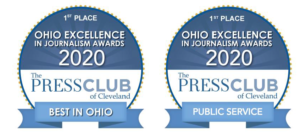If you want to get a rise out of a Cleveland Heights City Council member, float the suggestion that our city government is just OK.
For example, several weeks ago – in the aftermath of the Coventry flash mob and an unrelated violent assault near Lee Road – I sent a note to the entire council suggesting that the job of public safety director could be taken more seriously.
The position – which exists by virtue of the city charter – has been handled for years as just one of many responsibilities of the city manager. I wondered if, in these challenging times, the job may deserve somebody’s undivided attention – preferably that of someone with a history of innovation in the field of public safety and law enforcement.
Most council members never responded. One responded thoughtfully. And one wrote the following (I’m choosing not to reveal who, in recognition that all of us are occasionally subject to not-so-great moments at the keyboard):
You have taken disjointed pieces of information, with little bits of truth, and bits of untruths, and with no solid information and have made judgements that first of all are off base, and second of all sort of treat all of us as tho we have our heads in the sand.
In response to another citizen’s effort to draw City Hall’s attention to the concept of reverse-911 systems (increasingly common web-based systems that allow people to sign up to receive alerts and other communications from the police department), the same council person offered:
Do we want to send e-mails to the entire city if someone’s bike is stolen? This [the public safety issue] is very complicated and I am not sold on scaring folks when it is not necessary.
Criticism of the broken-window theory draws similar dismissal. Credit for implementing that theory here generally goes to former police chief, Martin Lentz in the 1970s, when he was relatively new to the job. It holds that if police pay attention to small things (i.e. broken windows), criminals will know that we care too much to let them operate here. It is the most common justification for the aggressive traffic enforcement for which Cleveland Heights is known.
While the theory makes intuitive sense to me, I wonder how relevant it is at a time when kids commit violent crimes for sport. And I wonder if the benefits really outweigh the costs – such as all those people from other communities who say they refuse to visit our business districts because they don’t need the aggravation of a ticket and they’re afraid of punks.
The broken-window theory has been identified as the basic strategy behind the way our police department operates. If that’s the case, there’s got to be some means of quantifying its impact and 40 years after its implementation, an evaluation seems reasonable.
Or we could just take it on faith, as the same council member did in an e-mail that was copied to me:
Our police run speed traps for many reasons, not the least of which is that if the police are VERY visible, and get folks for the small stuff, the bad guys go some where else. And it is a very successful technique. We are about the safest City, for our size in the State.
Statistically, this assertion may be true. But if people say they won’t come here because they don’t feel safe, and if people who live here are concerned that it seems less safe, what good are statistics? You can’t pass an ordinance that forces people to favor statistics over the gut.
My point is not to take a cheap shot at any of our elected council members – though I’ll be accused of doing so. Every one of them strikes me as hardworking, dedicated and sincere. Those I know personally – including the author of the above quotes – are energetic and enthusiastic and absolutely genuine in their motivation for undertaking their thankless service.
When it comes to handling the day-to-day issues of their constituents, our council members are attentive and often effective. If you bring a specific complaint or problem to any one of them, you can generally count on prompt follow-up from an appropriate City Hall staff member.
But these things are the workaday basics of the job, just as being able to hit and catch are basics of baseball. But the fact that these things get done doesn’t make our government excellent any more than being able to hit and catch a baseball makes somebody a Major League prospect.
Excellence would result in serious discussion about innovations in public safety that are fresher than the broken-window theory. Excellence would lead to newer ideas for working with other communities to reduce costs and increase our region’s economic well-being.
Excellence would be demonstrated by other communities showing interest in the work of our government and eagerly observing the impact of its best ideas – as they did in the ’70s and ’80s.
Excellence would result in Cleveland Heights being cited as an example of leadership and progress in the region, and in a general influx of residents and business – particularly in comparison with surrounding communities.
I’m not trying to imply that we’re disastrously headed in the opposite direction. But our real estate market, population trends and school enrollment aren’t doing better than the regional average. I suspect business tax receipts are no better, either. The big indicators would seem to demonstrate that Cleveland Heights is coping more than thriving.
Even in a bad economy there are winners and losers. Where in that spectrum is Cleveland Heights? And what kind of disruptive innovation is necessary to assure that we find ourselves as close as possible to the winning side?
South Euclid is backing two significant commercial developments in Oakwood and Cedar Center. My opinion on those is well documented – but it does represent an effort to change the status quo in a meanginful way. As does the merger discussion among Pepper Pike, Orange, Moreland Hills and Woodmere.
So without discounting the many meaningful things that our City Council accomplishes – a new soccer field at Denison Park, shared paving contracts with Shaker Heights, hiring of an economic development director, to name a few – I can’t help feeling that it shows evidence of a government that is a little bit too satisfied with old assumptions. Especially about the big issues that will make or break our future.
When there is evidence that our city goverment is just OK, I’ve heard too many elected officials claim the label of excellence that was earned by their predecessors 20 and 30 years ago.
In November, four City Council seats are up for election. It is with this perspective that I’ll choose how to vote.



ihjklhljk
glhjkgkhjgkhj
jkhjklhjkl
I find your lack of faith disturbing.